

TACSEI. What are the Teaching Tools?
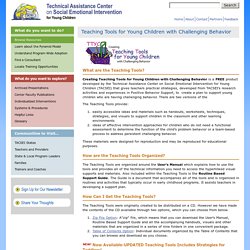
Creating Teaching Tools for Young Children with Challenging Behavior is a FREE product developed by the Technical Assistance Center on Social Emotional Intervention for Young Children (TACSEI) that gives teachers practical strategies, developed from TACSEI’s research activities and experiences in Positive Behavior Support, to create a plan to support young children who are having challenging behavior. There are two versions of the The Teaching Tools provide: easily accessible ideas and materials such as handouts, worksheets, techniques, strategies, and visuals to support children in the classroom and other learning environments ideas of effective intervention approaches for children who do not need a functional assessment to determine the function of the child’s problem behavior or a team-based process to address persistent challenging behavior.
These materials were designed for reproduction and may be reproduced for educational purposes. Too high a price: why I don’t do behaviour charts « Miss Night's Marbles. UPDATE, July 16, 2014: This post has morphed into a whole series of posts about how and why to manage your classroom using relationships instead of charts and systems.
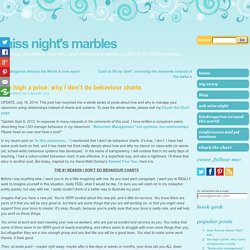
To read the whole series, please visit my Chuck the Chart page. *Update Sept 9, 2012: In response to many requests in the comments of this post, I have written a companion piece, describing how I DO manage behaviour in my classroom: “Behaviour Management” not systems, but relationships. Please head on over and have a look! * In my recent post on “In this classroom…” I mentioned that I don’t do behaviour charts. Before I say anything else, I want you to do a little imagining with me. Imagine that you have a new job. 05_10_EYC_Vol16_Carrie_Rose_article.pdf. Behaviour at School Study.
Punish them or engage them?
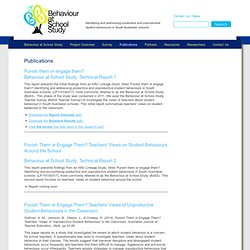
Behaviour at School Study: Technical Report 1 This report presents the initial findings from an ARC Linkage Grant, titled ‘Punish them or engage them? Challengingbehavior.fmhi.usf.edu/do/resources/documents/rph_pers_chall_beh.pdf. Challengingbehavior.fmhi.usf.edu/do/resources/documents/sek_cap_booklet.pdf. Journal.naeyc.org/btj/200809/pdf/RockingRolling.pdf. Links/FindingCausesMisbehavior.pdf. PictureSET: Category. Picture Cards. PECS cards. Social Skill Autopsies: A Strategy to Promote and Develop Social Competencies. By: Rick Lavoie (2005) Janet and I were enjoying a wonderful dinner at the home of friends.
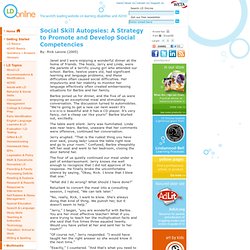
The hosts, Jerry and Linda, were the parents of a terrific young girl who attended our school. Barbie, twelve years old, had significant learning and language problems, and these difficulties often caused social difficulties. TACSEI. Child_rights. Good Children - At What Price? The Secret Cost Of Shame Australia. Written by: Robin Grille A five month old baby is lying in his mother’s arms.

He is close to sleep, then wakes and begins to grizzle. His mother tells him that he should stop being a naughty boy, and that she will be cross with him if he doesn’t sleep. An 18 month-old child is taken to a restaurant with her father and uncle. Her father goes to the bar, leaving the child with the uncle at the table. At an adult’s birthday party a six year old is awake long past his bedtime. Lying-swearing-cheating. Ter_key_social_biting. Chew on This: Responding to Toddlers Who Bite Biting is a very common behavior among toddlers, which means there are a lot of concerned parents out there.
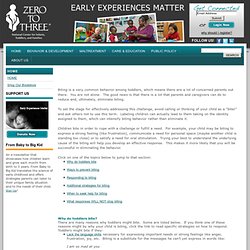
Praise and rewards. AFRC Briefing No. 11. You are in an archived section of the Child Family Community Australia (CFCA) site.
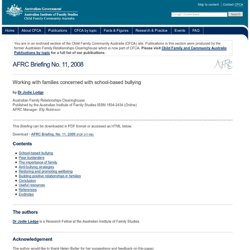
Publications in this section were produced by the former Australian Family Relationships Clearinghouse which is now part of CFCA. Please visit Child Family and Community Australia Publications by topic for a full list of our publications . by Dr Jodie Lodge Australian Family Relationships Clearinghouse Published by the Australian Institute of Family Studies ISSN 1834-2434 (Online) AFRC Manager: Elly Robinson This Briefing can be downloaded in PDF format or accessed as HTML below.
Download - AFRC Briefing, No. 11, 2008 (PDF 317 KB) Contents The authors. 10 Ways to Move Beyond Bully Prevention (And Why We Should) Published Online: March 4, 2008 Published in Print: March 5, 2008, as 10 Ways to Move Beyond Bully Prevention (And Why We Should) Commentary By Lyn Mikel Brown Seven years ago, I helped found a nonprofit organization committed to changing the culture for girls.

Our work was based on the health-psychology notion of “hardiness”—a way of talking about resilience that not only identifies what girls need to thrive in an increasingly complex and stressful world, but also makes clear that adults are responsible for creating safe spaces for girls to grow, think critically, and work together to make their lives better. As a result of this work, I’ve grown concerned lately that “bully prevention” has all but taken over the way we think about, talk about, and respond to the relational lives of children and youths in schools. Stop labeling kids. Talk accurately about behavior. Bullying. Please Listen. Home > Relationships > Communications Please Listen We found this poem among some old notes on the relationship between caregivers and patients.
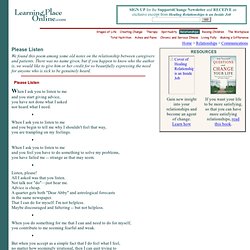
There was no name given, but if you happen to know who the author is, we would like to give him or her credit for so beautifully expressing the need for anyone who is sick to be genuinely heard. Please Listen. Effective Listening. "We were given two ears but only one mouth, because listening is twice as hard as talking.
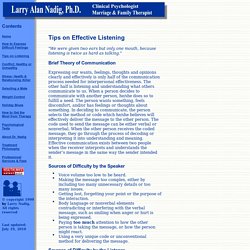
" Brief Theory of Communication Expressing our wants, feelings, thoughts and opinions clearly and effectively is only half of the communication process needed for interpersonal effectiveness. Biting, Pushing, Pulling Hair—Helping Children with Aggression. Biting! Hitting! Courses home at the WonderWise Parent. Taming Temper Tantrums. Teaching Strategies Acquires Parenting Counts Product Line. Dear Friends of Talaris: We are excited to announce that Teaching Strategies, a dynamic educational publishing company serving the early childhood community, has acquired the Parenting Counts product line, our research-based family of products designed to support parents and caregivers in raising socially and emotionally healthy children. We want to thank everyone who has been part of this remarkable journey. We are thrilled to have found the right organization to continue this important research and significantly expand the national and global distribution of these great products that we spent more than a decade developing.
Our goal for Talaris has always been to help parents and caregivers understand that learning begins at birth, the foundation for lifelong learning and relationships rests on the social and emotional development from birth to five, and the parent-child relationship is the most essential factor in a child’s healthy development. With great appreciation, Craig W. Tantrums. Tantrums; control; frustration; whining; anger; behaviour; discipline ; Tantrums happen when children are overwhelmed by strong feelings and lose control of their emotions and behaviour.